0091-11-25278301


Heavy machinery is the backbone of modern construction, infrastructure development, and road projects. These powerful machines make large-scale projects efficient and cost-effective, from excavators to asphalt drum mix plants. In this guide, we will explore different types of heavy machinery, their uses, key features, and expert tips for choosing the right one. We will also highlight the role of a reliable heavy machinery manufacturer and supplier in ensuring high-quality machinery for infrastructure projects.
Table of Contents
What is Heavy Machinery?
Importance of Heavy Machinery in Road Construction
Top 10 Types of Heavy Machinery & Their Uses
Excavators
Bulldozers
Loaders
Road Rollers
Asphalt Drum Mix Plant
Asphalt Batch Mix Plant
Concrete Batching Plant
Bitumen Pressure Distributors
Cranes
Dump Trucks
How to Choose the Right Heavy Machinery
Heavy Machinery Maintenance Tips
Latest Trends in Heavy Machinery
Conclusion
Heavy machinery refers to large, powerful machines designed for construction, road building, and industrial applications. These machines reduce manual labor, increase productivity, and enhance project accuracy. Various industries, including road construction, mining, and real estate, rely on advanced heavy machinery for smooth project execution.
In modern infrastructure projects, the efficiency of heavy machinery determines the success of road construction. Reliable equipment, such as asphalt drum mix plants and concrete batching plants, ensures that roads are built to high standards, meeting safety, and durability requirements. Road construction equipment suppliers play a crucial role in providing high-performance machines tailored to project needs.
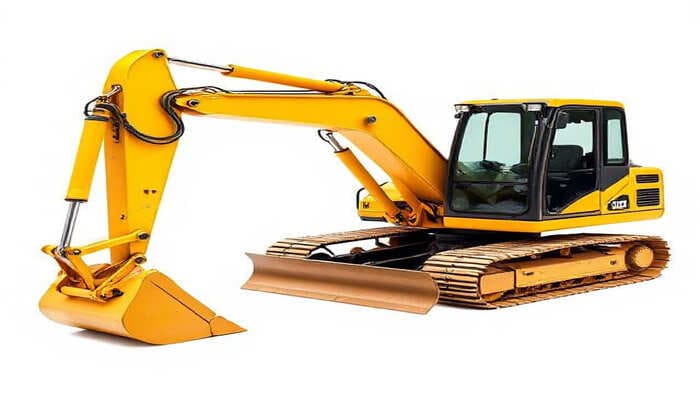
Excavators are powerful heavy machinery used for digging, lifting, and material handling in construction, mining, and roadwork. Equipped with a hydraulic system and a rotating cabin, they offer precision and efficiency in earthmoving tasks. Their versatility allows them to be fitted with various attachments like buckets, breakers, and grapples, making them ideal for trenching, demolition, and foundation work. Available in different sizes, from compact to large, excavators enhance productivity on job sites. A reliable road construction equipment manufacturer ensures durable and fuel-efficient models. Investing in a high-quality excavator boosts operational efficiency and reduces labor costs in large-scale projects.
Use: Digging trenches, demolitions, and material handling.
Key Features: Hydraulic system, rotating cabin, and multiple attachments.
Best For: Earthmoving, mining, and large-scale construction.
FAQs:
What are the primary uses of excavators?
Excavators are mainly used for digging, demolition, heavy lifting, and material handling in construction and mining projects.
How do I choose the right excavator for my project?
Consider the project scale, required digging depth, and bucket capacity before selecting an excavator.
What maintenance tips ensure the longevity of an excavator?
Regular lubrication, hydraulic system checks, and engine servicing can extend an excavator’s lifespan.
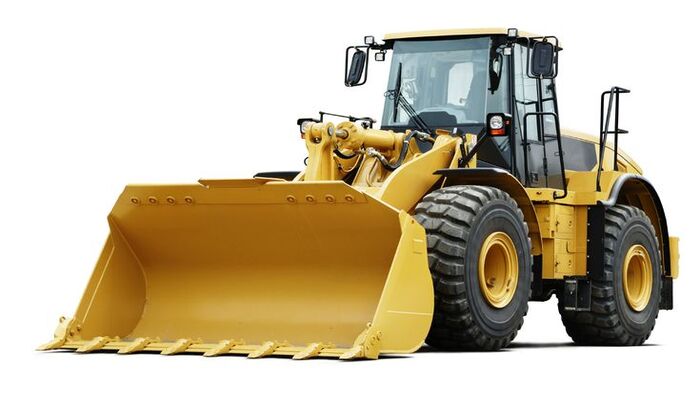
Bulldozers are powerful, heavy-duty machines designed for earthmoving, land clearing, and grading. Equipped with a large, sturdy metal blade in the front, bulldozers efficiently push soil, rocks, and debris to prepare construction sites. Their robust tracks provide stability and traction, allowing them to operate on rough and uneven terrain. Bulldozers are essential in road construction, mining, and large-scale infrastructure projects. Advanced models come with GPS technology for precision grading.
Use: Pushing heavy loads, land grading, and clearing debris.
Key Features: Large metal blade, tracked wheels, and powerful engine.
Best For: Construction sites and land development.
FAQs:
How does a bulldozer help in road construction?
Bulldozers level surfaces, remove debris and prepare the ground for further construction.
What are the different types of bulldozers?
There are crawler bulldozers, wheel bulldozers, and mini bulldozers, each suited for different terrains and tasks.
What safety precautions should be taken when operating a bulldozer?
Operators should wear protective gear, ensure proper visibility, and follow operational guidelines.
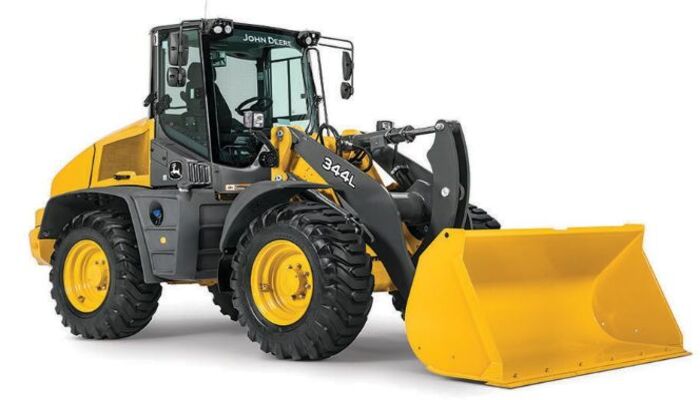
Loaders are essential heavy machinery used in construction and roadwork to lift, transport, and load materials like soil, gravel, and debris. Equipped with a large front bucket and powerful hydraulic arms, loaders efficiently handle bulk materials, making them indispensable for site preparation and material movement. They come in various types, including wheel loaders, skid-steer loaders, and backhoe loaders, each suited for specific tasks. Loaders enhance productivity in projects by speeding up material handling while reducing manual labor. Their versatility and ability to operate in various terrains make them a crucial part of road construction and infrastructure development projects.
Use: Lifting and transporting heavy materials.
Key Features: Large bucket, strong hydraulic arm.
Best For: Road construction and material handling.
FAQs:
What is the difference between a loader and an excavator?
A loader is used for moving materials, while an excavator is mainly for digging and demolition.
How much weight can a loader lift?
The lifting capacity varies based on the model, but it typically ranges from 1,000 kg to 20,000 kg.
What are the common attachments used with loaders?
Common attachments include buckets, forks, grapples, and augers.
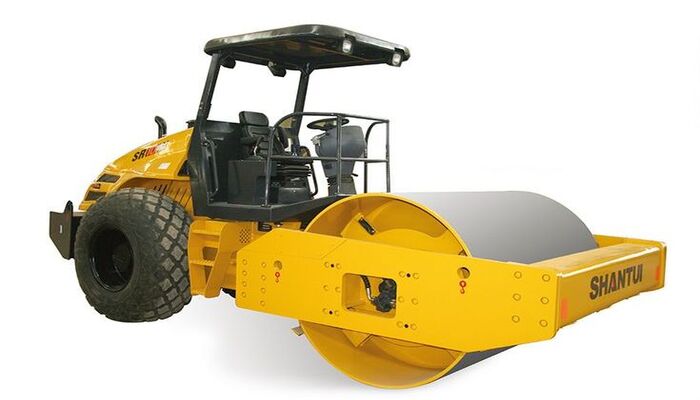
Road Rollers are essential heavy machinery used in road construction for compacting soil, asphalt, and other materials to create smooth and durable surfaces. These machines come in different types, including single-drum, double-drum, and pneumatic rollers, each designed for specific compaction tasks. Equipped with a heavy steel drum and vibration mechanisms, road rollers ensure maximum density and stability in road foundations. They improve road longevity by eliminating air pockets and preventing future surface damage. Choosing the right road roller depends on project size, terrain, and material type. Reliable road construction equipment manufacturers provide high-performance rollers tailored to industry needs.
Use: Compaction of soil, asphalt, and concrete.
Key Features: Heavy steel drum, vibration mechanism.
Best For: Road and pavement construction.
FAQs:
What are the different types of road rollers?
The main types are smooth wheel rollers, padfoot rollers, and pneumatic rollers.
How does compaction improve road durability?
Compaction reduces air voids, increases density, and strengthens the road foundation.
What is the ideal weight for a road roller?
The weight varies from 1 ton to 20 tons depending on the application.
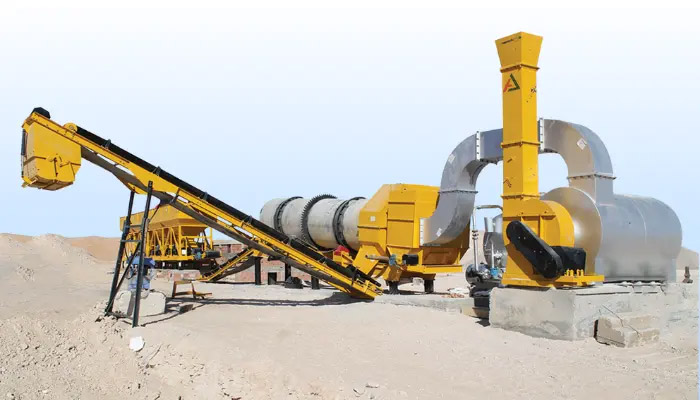
An Asphalt Drum Mix Plant is a continuous mixing plant designed for high-efficiency asphalt production. It ensures a steady supply of hot mix asphalt, making it ideal for large-scale road construction projects. The plant features a robust drying and mixing drum, advanced pollution control, and fuel-efficient burners, ensuring consistent quality. With automated controls, precise aggregate mixing, and customizable output, it enhances productivity and cost-effectiveness. As a leading road construction equipment manufacturer, Alfa Omega India provides durable and efficient asphalt drum mix plants that meet industry standards. Ideal for highways, airports, and infrastructure projects, these plants ensure superior road quality.
Use: Producing continuous asphalt mix for road construction.
Key Features: High production capacity, fuel efficiency, automated controls.
Best For: High-volume road projects requiring a steady asphalt supply.
FAQs:
What is the difference between drum mix and batch mix asphalt plants?
Drum mix plants provide continuous production, while batch mix plants produce asphalt in batches for better quality control.
How does an asphalt drum mix plant work?
It continuously mixes aggregates and bitumen at high temperatures to produce asphalt.
What factors affect the efficiency of an asphalt drum mix plant?
Factors include burner efficiency, drum rotation speed, and material quality.
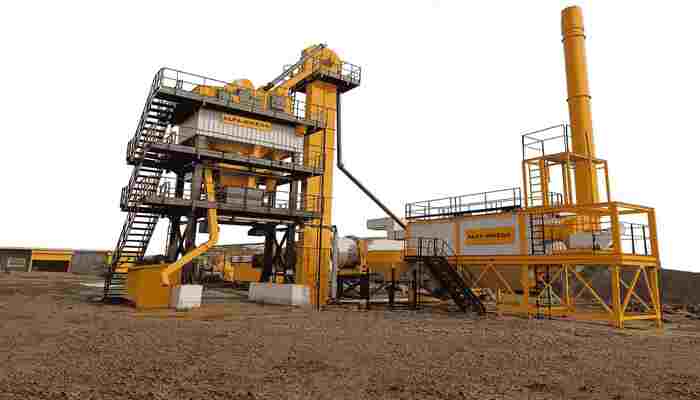
An Asphalt Batch Mix Plant is essential for road construction, producing high-quality asphalt in controlled batches. It ensures precise mixing of aggregates, bitumen, and fillers, delivering superior pavement quality. This Asphalt Batch Mix Plant is ideal for large-scale projects requiring consistency and flexibility in mix design. Key features include a drying drum, a vibrating screen, hot bins, and a mixing unit. As a leading road construction equipment manufacturer, Alfa Omega India provides efficient, fuel-saving plants with advanced automation. These plants enhance productivity, reduce material wastage, and meet environmental standards, making them the preferred choice for durable, high-performance roads and highways.
Use: Producing high-quality asphalt mix in batches for better quality control.
Key Features: Precision weighing, efficient mixing, multiple storage options.
Best For: Projects requiring customized asphalt mix compositions.
FAQs:
How does an asphalt batch mix plant differ from a drum mix plant?
A batch mix plant produces asphalt in batches, ensuring precise composition, while a drum mix plant provides continuous production.
What are the advantages of an asphalt batch mix plant?
It allows better quality control, flexibility in mix design, and efficient fuel usage.
What factors impact the performance of an asphalt batch mix plant?
Factors include aggregate quality, burner efficiency, and proper maintenance.
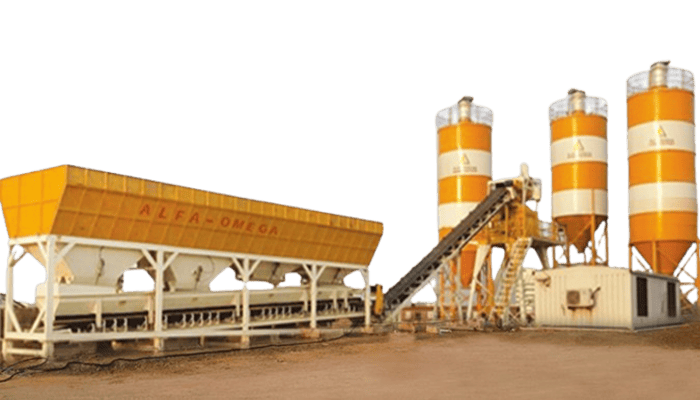
A Concrete Batching Plant is essential for producing high-quality concrete in construction projects. It accurately mixes cement, aggregates, water, and additives to ensure strength and consistency. These plants are available in stationary and mobile versions, catering to different project needs. A Concrete Batching Plant from a reliable road construction equipment manufacturer features automated controls for enhanced efficiency and reduced material wastage. Widely used in roads, bridges, and infrastructure development, they increase productivity and quality. Choosing a trusted road construction equipment supplier ensures durable, energy-efficient batching plants that deliver optimal performance based on project requirements.
Use: Producing high-quality concrete by mixing cement, aggregates, and water.
Key Features: Automated controls, precise weighing system, high mixing efficiency.
Best For: Large construction projects requiring consistent concrete production.
FAQs:
What are the types of concrete batching plants?
The main types are stationary batching plants and mobile batching plants, each suited for different project needs.
How does a concrete batching plant work?
It systematically measures and mixes cement, aggregates, and water to produce high-quality concrete.
What are the benefits of using a concrete batching plant?
It ensures consistent quality, reduces labor costs, and improves efficiency in construction projects.
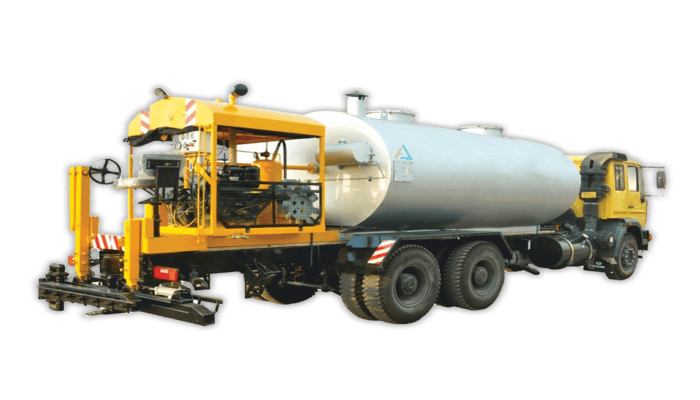
Bitumen Pressure Distributors play a crucial role in road construction by ensuring uniform spraying of bitumen for durable and high-quality pavements. These machines efficiently control the flow and temperature of bitumen, optimizing adhesion between layers. As a leading road construction equipment manufacturer, Alfa Omega India provides high-performance bitumen pressure distributors designed for precision and efficiency. With automated controls and a robust heating system, these machines enhance road-building processes. Whether for large-scale highways or small road projects, investing in a reliable bitumen pressure distributor ensures cost-effective and long-lasting road surfaces, making it an essential tool for modern infrastructure development.
Use: Spraying bitumen uniformly on the road surface for better adhesion of asphalt layers.
Key Features: Precise spray control, insulated storage tank, and efficient heating system.
Best For: Road construction projects requiring accurate bitumen distribution.
FAQs:
What is the purpose of a bitumen pressure distributor?
It ensures even distribution of bitumen on road surfaces before asphalt layering, enhancing road durability.
How does a bitumen pressure distributor work?
It heats and sprays bitumen at a controlled rate using a calibrated spraying mechanism.
What factors affect the efficiency of a bitumen pressure distributor?
Factors include spray bar calibration, pump efficiency, and bitumen heating system performance.
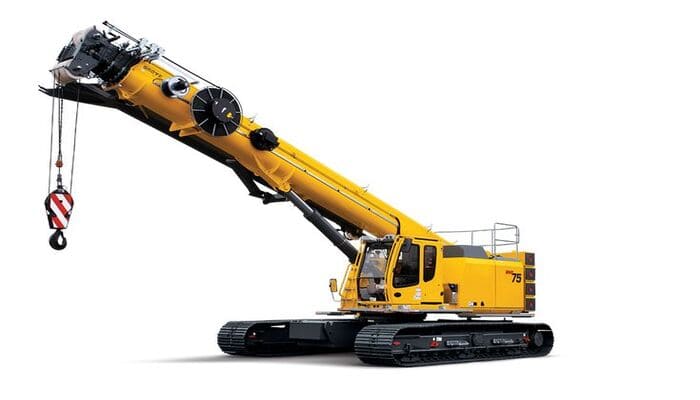
Cranes are essential heavy machinery used in construction, manufacturing, and infrastructure projects for lifting and transporting heavy materials. These powerful machines come in various types, such as tower cranes, mobile cranes, and overhead cranes, each designed for specific tasks. A reliable road construction equipment manufacturer ensures that cranes are durable, efficient, and meet industry safety standards. Whether used for bridge construction or high-rise buildings, cranes improve efficiency and reduce manual labor.
Use: Lifting and transporting heavy materials at construction sites and industrial projects.
Key Features: High load capacity, telescopic boom, 360-degree rotation.
Best For: High-rise construction, bridge building, and heavy equipment transport.
FAQs:
What are the main types of cranes used in construction?
Common types include tower cranes, mobile cranes, and crawler cranes, each suited for specific lifting needs.
How does a crane ensure safe lifting operations?
Cranes use counterweights, load sensors, and stability control systems to ensure safe operations.
What factors determine the load capacity of a crane?
The boom length, counterweights, and crane type influence its maximum load capacity.
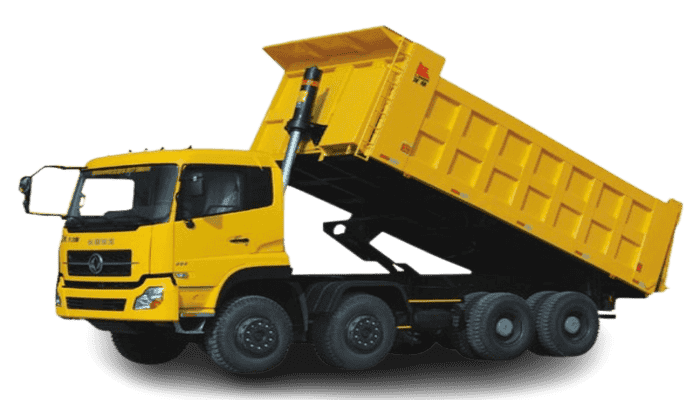
Dump trucks are essential for transporting and unloading bulk materials like sand, gravel, and construction debris. These heavy-duty vehicles come with hydraulic lifting mechanisms that tilt the truck bed, allowing quick material dumping. They are widely used in road construction, mining, and large infrastructure projects. Dump trucks vary in size, from small site dumpers to massive off-road haulers, catering to different project needs. Choosing a reliable dump truck ensures efficiency, durability, and cost savings.
Use: Transporting loose materials like sand, gravel, and demolition waste.
Key Features: Large open-box bed, hydraulic lifting mechanism, high load capacity.
Best For: Hauling heavy materials at construction sites and mining operations.
FAQs:
What are the different types of dump trucks?
The main types include standard dump trucks, articulated dump trucks, and transfer dump trucks, each suited for different applications.
How does a dump truck work?
It uses a hydraulic system to lift the open-box bed, allowing materials to be unloaded easily.
What should be considered when selecting a dump truck?
Factors like load capacity, terrain compatibility, and fuel efficiency should be considered when choosing a dump truck.
Project Requirements: Select machinery based on workload, terrain, and material type.
Fuel Efficiency: Opt for machines with lower fuel consumption and high productivity.
Brand & Manufacturer Reputation: Go for trusted names like Alfa Omega India for durability and performance.
After-Sales Support: Ensure spare parts and servicing options are available.
Regular inspections and servicing.
Proper lubrication of moving parts.
Safe storage and handling practices.
Smart automation in road construction equipment.
Eco-friendly, fuel-efficient machines.
Integration of AI and IoT for predictive maintenance.
Heavy machinery is vital for large-scale projects, from road construction to industrial applications. Choosing the right equipment ensures efficiency, safety, and cost-effectiveness. Explore Alfa Omega India’s range of heavy machinery solutions for high-quality road construction equipment.
Copyright © 2026 Alfa Omega Enterprises. All rights reserved.

 WhatsApp Chat
Request A Quote
WhatsApp Chat
Request A Quote
Leave a Reply
Your email address will not be published / Required fields are marked *